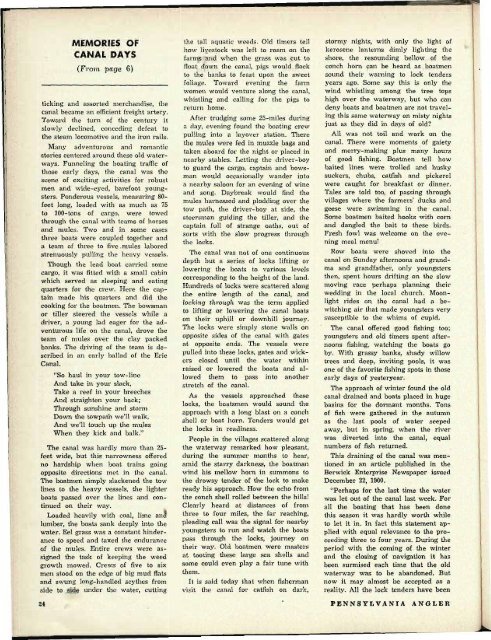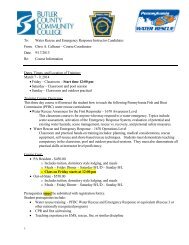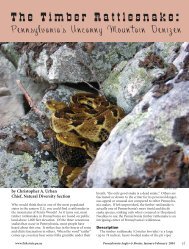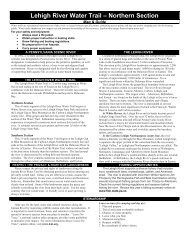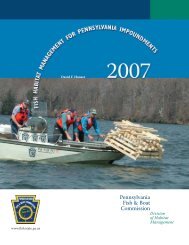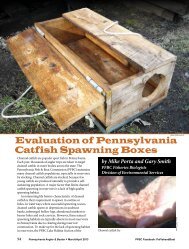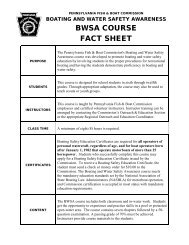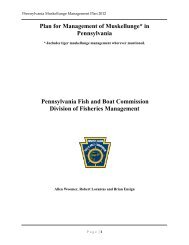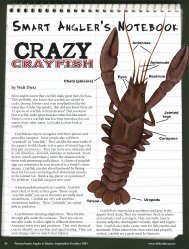pennsylvania angler 1953 - Pennsylvania Fish and Boat Commission
pennsylvania angler 1953 - Pennsylvania Fish and Boat Commission
pennsylvania angler 1953 - Pennsylvania Fish and Boat Commission
You also want an ePaper? Increase the reach of your titles
YUMPU automatically turns print PDFs into web optimized ePapers that Google loves.
MEMORIES OF<br />
CANAL DAYS<br />
(From page 6)<br />
ticking <strong>and</strong> assorted merch<strong>and</strong>ise, the<br />
canal became an efficient freight artery.<br />
Toward the turn of the century it<br />
slowly declined, conceding defeat to<br />
the steam locomotive <strong>and</strong> the iron rails.<br />
Many adventurous <strong>and</strong> romantic<br />
stories centered around these old waterways.<br />
Funneling the boating traffic of<br />
those early days, the canal was the<br />
scene of exciting activities for robust<br />
men <strong>and</strong> wide-eyed, barefoot youngsters.<br />
Ponderous vessels, measuring 80feet<br />
long, loaded with as much as 75<br />
to 100-tons of cargo, were towed<br />
through the canal with teams of horses<br />
<strong>and</strong> mules. Two <strong>and</strong> in some cases<br />
three boats were coupled together <strong>and</strong><br />
a team of three to five .mules labored<br />
strenuously pulling the heavy vessels.<br />
Though the lead boat carried some<br />
cargo, it was fitted with a small cabin<br />
which served as sleeping <strong>and</strong> eating<br />
quarters for the crew. Here the captain<br />
made his quarters <strong>and</strong> did the<br />
cooking for the boatmen. The bowsman<br />
or tiller steered the vessels while a<br />
driver, a young lad eager for the adventurous<br />
life on the canal, drove the<br />
team of mules over the clay packed<br />
banks. The driving of the team is described<br />
in an early ballad of the Erie<br />
Canal.<br />
"So haul in your tow-line<br />
And take in your slack,<br />
Take a reef in your breeches<br />
And straighten your back;<br />
Through sunshine <strong>and</strong> storm<br />
Down the towpath we'll walk,<br />
And we'll touch up the mules<br />
When they kick <strong>and</strong> balk."<br />
The canal was hardly more than 25feet<br />
wide, but this narrowness offered<br />
no hardship when boat trains going<br />
opposite directions met in the canal.<br />
The boatmen simply slackened the tow<br />
lines to the heavy vessels, the lighter<br />
boats passed over the lines <strong>and</strong> continued<br />
on their way.<br />
Loaded heavily with coal, lime <strong>and</strong><br />
lumber, the boats sank deeply into the<br />
water. Eel grass was a constant hinderance<br />
to speed <strong>and</strong> taxed the endurance<br />
of the mules. Entire crews were assigned<br />
the task of keeping the weed<br />
growth mowed. Crews of five to six<br />
men stood on the edge of big mud flats<br />
<strong>and</strong> swung long-h<strong>and</strong>led scythes from<br />
side to side under the water, cutting<br />
the tall aquatic weeds. Old timers tell<br />
how livestock was left to roam on the<br />
farms <strong>and</strong> when the grass was cut to<br />
float down the canal, pigs would flock<br />
to the banks to feast upon the sweet<br />
foliage. Toward evening the farm<br />
women would venture along the canal,<br />
whistling <strong>and</strong> calling for the pigs to<br />
return home.<br />
After trudging some 25-miles during<br />
a day, evening found the boating crew<br />
pulling into a layover station. There<br />
the mules were fed in muzzle bags <strong>and</strong><br />
taken aboard for the night or placed in<br />
nearby stables. Letting the driver-boy<br />
to guard the cargo, captain <strong>and</strong> bowsman<br />
would occasionally w<strong>and</strong>er into<br />
a nearby saloon for an evening of wine<br />
<strong>and</strong> song. Daybreak would find the<br />
mules harnessed <strong>and</strong> plodding over the<br />
tow path, the driver-boy at side, the<br />
steersman guiding the tiller, <strong>and</strong> the<br />
captain full of strange oaths, out of<br />
sorts with the slow progress through<br />
the locks.<br />
The canal was not of one continuous<br />
depth but a series of locks lifting or<br />
lowering the boats to various levels<br />
corresponding to the height of the l<strong>and</strong>.<br />
Hundreds of locks were scattered along<br />
the entire length of the canal, <strong>and</strong><br />
locking through was the term applied<br />
to lifting or lowering the canal boats<br />
on their uphill or downhill journey.<br />
The locks were simply stone walls on<br />
opposite sides of the canal with gates<br />
at opposite ends. The vessels were<br />
pulled into these locks, gates <strong>and</strong> wickers<br />
closed until the water within<br />
raised or lowered the boats <strong>and</strong> allowed<br />
them to pass into another<br />
stretch of the canal.<br />
As the vessels approached these<br />
locks, the boatsmen would sound the<br />
approach with a long blast on a conch<br />
shell or boat horn. Tenders would get<br />
the locks in readiness.<br />
People in the villages scattered along<br />
the waterway remarked how pleasant,<br />
during the summer months to hear,<br />
amid the starry darkness, the boatman<br />
wind his mellow horn in summons to<br />
the drowsy tender of the lock to make<br />
ready his approach. How the echo from<br />
the conch shell rolled between the hills!<br />
Clearly heard at distances of from<br />
three to four miles, the far reaching,<br />
pleading call was the signal for nearby<br />
youngsters to run <strong>and</strong> watch the boats<br />
pass through the locks, journey on<br />
their way. Old boatmen were masters<br />
at tooting these large sea shells <strong>and</strong><br />
some could even play a fair tune with<br />
them.<br />
It is said today that when fisherman<br />
visit the canal for catfish on dark,<br />
stormy nights, with only the light of<br />
kerosene lanterns dimly lighting the<br />
shore, the resounding bellow of the<br />
conch horn can be heard as boatmen<br />
sound their warning to lock tenders<br />
years ago. Some say this is only the<br />
wind whistling among the tree tops<br />
high over the waterway, but who can<br />
deny boats <strong>and</strong> boatmen are not traveling<br />
this same waterway on misty nights<br />
just as they did in days of old?<br />
All was not toil <strong>and</strong> work on the<br />
canal. There were moments of gaiety<br />
<strong>and</strong> merry-making plus many hours<br />
of good fishing. <strong>Boat</strong>men tell how<br />
baited lines were trolled <strong>and</strong> husky<br />
suckers, chubs, catfish <strong>and</strong> pickerel<br />
were caught for breakfast or dinner.<br />
Tales are told too, of passing through<br />
villages where the farmers' ducks <strong>and</strong><br />
geese were swimming in the canal.<br />
Some boatmen baited hooks with corn<br />
<strong>and</strong> dangled the bait to these birds.<br />
Fresh fowl was welcome on the evening<br />
meal menu!<br />
Row boats were shoved into the<br />
canal on Sunday afternoons <strong>and</strong> gr<strong>and</strong>ma<br />
<strong>and</strong> gr<strong>and</strong>father, only youngsters<br />
then, spent hours drifting on the slow<br />
moving race perhaps planning their<br />
wedding in the local church. Moonlight<br />
rides on the canal had a bewitching<br />
air that made youngsters very<br />
susceptible to the whims of cupid.<br />
The canal offered good fishing too;<br />
youngsters <strong>and</strong> old timers spent afternoons<br />
fishing, watching the boats go<br />
by. With grassy banks, shady willow<br />
trees <strong>and</strong> deep, inviting pools, it was<br />
one of the favorite fishing spots in those<br />
early days of yesteryear.<br />
The approach of winter found the old<br />
canal drained <strong>and</strong> boats placed in huge<br />
basins for the dormant months. Tons<br />
of fish were gathered in the autumn<br />
as the last pools of water seeped<br />
away, but in spring, when the river<br />
was diverted into the canal, equal<br />
numbers of fish returned.<br />
This draining of the canal was mentioned<br />
in an article published in the<br />
Berwick Enterprise Newspaper issued<br />
December 22, 1900.<br />
"Perhaps for the last time the water<br />
was let out of the canal last week. For<br />
all the boating that has been done<br />
this season it was hardly worth while<br />
to let it in. In fact this statement applied<br />
with equal relevance to the proceeding<br />
three to four years. During the<br />
period with the coming of the winter<br />
<strong>and</strong> the closing of navigation it has<br />
been surmised each time that the old<br />
waterway was to be ab<strong>and</strong>oned. But<br />
now it may almost be accepted as a<br />
reality. All the lock tenders have been<br />
24 PENNSYLVANIA ANGLER


